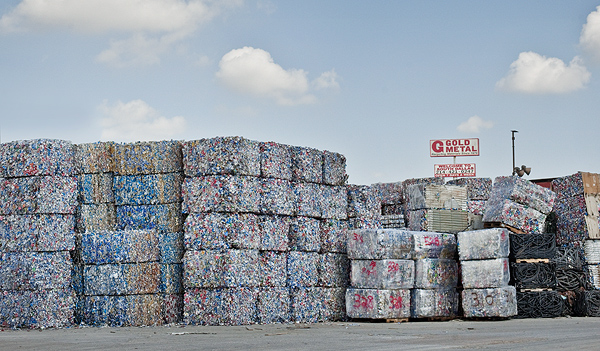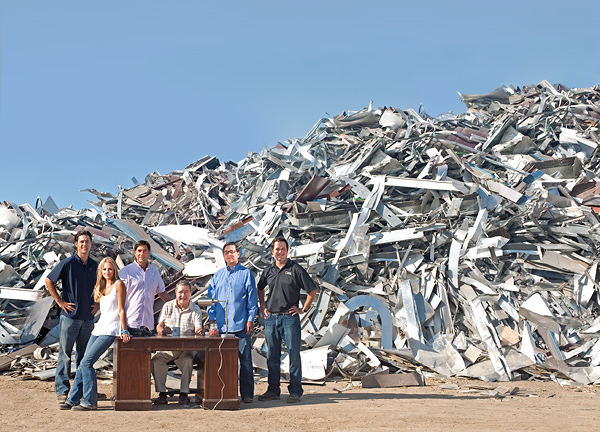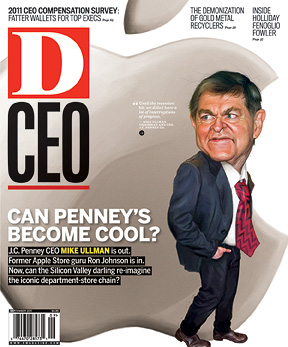Imagine you’re the owner of a 35-year-old company with $750 million in annual revenue.
Your business is one of the biggest privately owned outfits of its kind in the Southwest, providing a total of 420 jobs at seven locations in two states. It’s also a much-lauded corporate philanthropist, contributing to hundreds of charities and organizations and winning awards for its commitment to improving the community.
Now suppose that neighborhood activists and the region’s largest newspaper have embarked on a crusade against your entirely legal, flagship operation, even calling for it to move someplace else.
Someplace you have no interest in going.
That’s the situation facing family-owned Gold Metal Recyclers Ltd., whose headquarters is in the 4300 block of South Lamar Street in South Dallas. Founded in 1976 by brothers Kenny and Neil Goldberg, Gold Metal finds itself in this squeeze because it’s based in an area zoned for heavy-industrial use across a four-lane road from a struggling residential neighborhood.
For a variety of aesthetic and environmental reasons, editorial writers with The Dallas Morning News and the activists have decided that the company is a blight and is holding back the area’s progress. The Goldbergs, not surprisingly, reject this characterization. And that, in a nutshell, is the crux of this bitter, ongoing battle.
It’s a fascinating struggle underscoring the rights of a private enterprise versus the responsibility that others claim it has to the community around it. It also raises the question: Is it realistic, or naive, to believe that extinguishing one successful business will help lift up the living standard of its neighbors?
“We honestly don’t know why they’re harping on us specifically,” says Bob Goldberg, 84, who worked three decades for Dallas-based Commercial Metals Co. and taught his sons Kenny and Neil the metal-recycling business. Sitting in a modestly furnished conference room at Gold Metal, where he’s worked for the boys since the early 1980s, Goldberg adds, “We’re the nicest thing around here.”
Wrecking Yards, Boarded-Up Homes
In this area of South Lamar Street, “nicest thing” is a relative term. Situated more than three miles southeast of downtown Dallas, between U.S. 175 and the Trinity River, some railroad tracks, and Interstate 45, Gold Metal squats on a gritty street dotted with liquor stores, fast-food joints, wrecking yards, machine shops, and a handful of other metal-recycling facilities.
Not far to the south, there’s a big Borden Milk plant. To the north, the Dallas Independent School District operates a “service center” that once was a Procter & Gamble soap-making factory. Across the street from Gold Metal, on the east side of Lamar, there’s a Baptist church and a neighborhood of modest houses, more than a few of them boarded up and vacant.
This is the area where, in the mid-1970s, Kenny and Neil Goldberg leased a third of an acre to start their business. They weren’t strangers to the vicinity back then, by any means.
Their father grew up not far away, on Colonial Avenue, and attended southern Dallas’ Colonial Hill elementary school and Forest Avenue High School (now called James Madison High School). After serving in the Navy during World War II, the elder Goldberg went to work for Commercial Metals on South Good Latimer.
Bob worked in Commercial’s scrap-metals division. After both his sons graduated from The University of Texas at Austin, they joined him at Commercial Metals. The company dispatched Kenny to its operation in Lubbock, but he soon found he’d rather work in Dallas.
Back home, the land on Lamar Street became available. So Kenny and Neil quit Commercial Metals to start their own recycling company. The dirt they rented was set between two scrap yards and an abandoned gasoline station, not far from the former site of a drive-in movie theater.
The brothers began with just one employee who bought and sold scrap metal. Over the years, they’ve steadily added employees and acreage. Today, in addition to Texas sites in Dallas, Fort Worth, Gainesville, Houston, and Liberty, and another in Albuquerque, N.M., Gold Metal owns about 41 acres on Lamar where 200 employees work. The company says at least half of those employees live in the two nearby ZIP codes.
Tight Margins
Inside the company’s main office, and outside in its sprawling, concrete-and-asphalt-paved scrap yard, Gold Metal (the name is a play on the owners’ name) seems like an uncommonly industrious enterprise. Employees are intent on their jobs in every corner of the busy facility.
There’s a reason they’re so busy. The company handles more than 500 million pounds of ferrous and non-ferrous metals each year, including half a billion recycled aluminum cans. “We’re probably the largest non-ferrous recycler in the country,” says Kenny Goldberg, 58, referring to all the metals (like aluminum, brass, copper, electrical cable, and nickel) that don’t include iron and steel (iron and steel are the “ferrous” stuff).
Gold Metal buys its scrap from three types of customers. They are “peddlers” (mom ‘n’ pop types who bring in the likes of aluminum cans and unused machine-shop copper); “dealers,” which are other, smaller recycling firms, many of them from surrounding Texas towns; and “independents” such as manufacturing companies that produce excess copper or aluminum products.
The Goldbergs collect, sort, process, and package this scrap, then recycle it on “very tight margins” to brokers, partly for export into the international markets. (About two-thirds of all metal used in manufacturing is recycled.) The company’s customers include Raytheon, Alcoa Aluminum, Kaiser, Vought Aircraft, and Lockheed Martin.
Out in the scrap yard one recent afternoon, dozens of Gold Metal employees—most of whom earn $10 to $15 an hour; supervisors make $15 to $25—are hurrying here and there among huge piles of brass, cans, copper wire, sheet aluminum, and air-conditioning coils. Scrap-laden trucks and a steady stream of “peddlers” drive in and out, producing bags or boxes filled with recyclable material. A big overhead sign warns: “If you stole it, we don’t want it.”
Defending The “Politically Powerless”
Despite this thriving and prosperous scene—or, perhaps, because of it—the Dallas Morning News has published a number of editorials lambasting Gold Metal’s operation on South Lamar.
The daily newspaper, which won the 2010 Pulitzer Prize for editorial writing for its ongoing “Bridging Dallas’ North-South Gap” project, insists that established southern Dallas recycling yards like Gold Metal should not be located near residential neighborhoods, despite zoning laws that have been in place for years. The Morning News suggests that Gold Metal should relocate instead to the International Inland Port of Dallas area off South Central Expressway. (Another recycler, Oak Cliff Metals, recently agreed to move not far from there.)
DMN editorial writers including Tod Robberson say they’re defending the “politically powerless” residents of South Lamar, whose property values, quality of life, and development opportunities have historically suffered because of the recycling companies. Gold Metal, the newspaper contends, is ugly, dusty, and noisy. It creates too much vehicle traffic, the paper says, and its land is “contaminated” to boot.

In addition, the paper has accused District 7 City Council member Carolyn Davis, who represents South Lamar, of favoring Gold Metal over the interests of nearby residents because the Goldbergs contributed money to her re-election campaign. A spokeswoman for Davis said she was “in and out of the city” and could not speak with D CEO about Gold Metal.
Writer Jim Schutze of the weekly Dallas Observer, meantime, has written extensively about the Morning News crusade against Gold Metal. He calls it a hypocritical effort by “recovering bullies.”
The “News’ editorial page has focused on a few businesses that happen to be right in the path of the newspaper’s own grandest designs for the Trinity River,” Schutze wrote in June. “The News has propounded a theory by which the city should use its police and zoning powers to run people off land they already own. The paper doesn’t care how many jobs they provide. We take people who are obeying the law, obeying the regulations and keeping faith with the neighbors, not to mention making a payroll, and we’re going to use tricks to put them out of business? Why is that not absolutely outrageous?”
“Stereotyping And Degradation”
On a sweltering Saturday in June, a community group called Unify South Dallas has gathered for one of its regular meetings at the Forest Heights Community Center on Holmes Street, off South Lamar. Led by Walter “Changa” Higgins, Unify’s chairman, the group has several topics on its agenda this morning, including payday lending, the school-budget crisis—and Gold Metal Recyclers.






